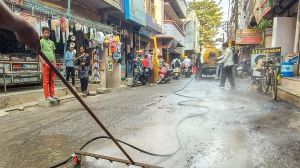Testing the waters
In the week that the election results were announced in June 1991, the Cauvery waters Tribunal announced its interim award. Eight years a...

In the week that the election results were announced in June 1991, the Cauvery waters Tribunal announced its interim award. Eight years and three elections later, there is neither any implementation of the award nor any sign of a permanent settlement.
The establishment of the tribunal under the Inter-State Rivers Waters Disputes Act, 1956, was the monumental achievement of the Karunanidhi administration of 1989-91. Within a year of its being constituted, the three-man tribunal had toured the entire length of the basin, assembled the relevant data, heard every shade of expert opinion, and been thoroughly exposed to both the political complexities of their task and the high emotions attached to it. Yet, a mere twelve month is all it took them to identify the essentials of the problem and set the parameters. The tribunal determined the required minimum annual flow from Karnataka to Tamil Nadu at 205 tmc. Recognising that agriculture is seasonal, and that if water is not received when required it is useless ifreceived when not required, the tribunal determined the minimum requirement on a week-by-week basis, particularly for the two major paddy crops kuruvai in the summer and samba in the winter. Provision was made for any shortfall in one week to be compensated by additional supplies in the following week. Finally, the tribunal kept itself in permanent readiness to convene at immediate notice to resolve any specific problems that might arise in implementation. A final settlement was scheduled for a few months later, possibly before the year 1991 was out.
Where do matters stand eight years on? Traditionally, for as far back as farmers8217; memories go, the gates of the Mettur reservoir have been opened on June 12. For the first time in decades, the gates remained closed on June 12 this year. This notwithstanding last year8217;s agreement to establish a monitoring authority for the implementation of the interim award at the highest possible level: chaired by the Prime Minister, no less, and comprising thechief ministers concerned, no less. And yet the gates remained firmly shut because of the level of water in the reservoir was way below the minimum required. What, then, is being implemented? What is being monitored?
Unsurprisingly, a monitoring authority as high-powered as this can but find time very occasionally, very intermittently to check out implementation. It has, in fact, met exactly once in the year that has passed since the much-hyped accord of August 1998. That one meeting lasted less than one day. Its net outcome was that the Chief Minister of Tamil Nadu claimed the water received by his state was half the quantity the Chief Minister of Karnataka claimed had flowed down the Cauvery. The chief ministers could not agree even on where to measure the flow at the outlet point or the inlet point. The Prime Minister was unable to mediate a solution. In the many months that have passed since the solitary meeting of the Cauvery Authority, experts and officials have not resolved any of the outstandingissues. Meanwhile, half the claimed outflow has apparently vanished into the sky and the gates of the Mettur reservoir remained shut for all of June.
The interim award of the Cauvery tribunal identifies June as the crucial month for irrigating the kuruvai crop. Through the month of June 1999, and down to the end of July, there has been no monitoring of the implementation of the award, and, therefore, of course, no week-by-week monitoring, and no week-by-week compensation of shortfalls. The interim award remains a discarded scrap of paper, notwithstanding the Supreme Court8217;s directive that the award be implemented and the pledge by the Prime Minister to abide by the Supreme Court8217;s orders. I charge Vajpayee with being in contempt of court.
As regards the final settlement, which was expected in April 1999, before the commence of the current kuruvai season, all we have had is a silence more thundering than the reverberations of the Cauvery tumbling down the Hogenakkal falls. No one 8212; at leastnone that I have been able to access 8212; seems to have the least idea as to when the Cauvery Tribunal will give its final award. Or even whether this will ever happen.
Not content with this deception, Karunanidhi and Chandrababu Naidu continue their fraud over the Telugu Ganga project. It was Indira Gandhi who brokered an agreement in principle, followed by Rajiv Gandhi, who mediated the details of the settlement, that water from Krishna river would be diverted to meet the drinking water requirements of Chennai. Massive amounts of money, largely from the largesse of the central government, are involved.
Fifteen years down the line, there is little sign of the Telugu Ganga project coming to fruition. Where the money has gone is for Chandrababu Naidu to explain. Meanwhile, he and Karunanidhi are touting the 8220;solution8221; they devised in 1996. The context was the nagarpalika elections in Tamil Nadu. More specifically, the moot point was that Karunanidhi was fielding his son, Stalin, for Mayor ofChennai.
The voters of Chennai enquired, quite reasonably, why they should vote for the son of a father who had failed to secure them water to drink. To overcome this hurdle to dynastic politics, Karunanidhi got through to that other scion of dynastic politics, the Chief Minister of neighbouring Andhra Pradesh, and leaned on him in the family interest to divert the waters of the Pennar to Chennai. The Pennar is, of course, not the Krishna. And the Krishna is what the Telugu Ganga project is based on. Three years after Naidu helped Karunanidhi get his son elected Mayor of Chennai, the Telugu Ganga project remains a pie in the sky a rather remunerative pie, at that, for those running Naidu8217;s irrigation department. The price of this chicanery is being paid by the farmers of Rayalseema and Nellore who, having nothing to do with Telugu Ganga, are agitating to ring the curtain down on Chandrababu8217;s term as Chief Minister.
It is the politics of deception that is on test in Tamil Nadu. Which is why the DMK andits partner in deception, the BJP, are headed in the polls for the severe chastisement they so richly deserve.
Aiyar is a Congress party official buts these views are his own
- 0117 hours ago
- 0217 hours ago
- 0317 hours ago
- 048 hours ago
- 0518 hours ago































